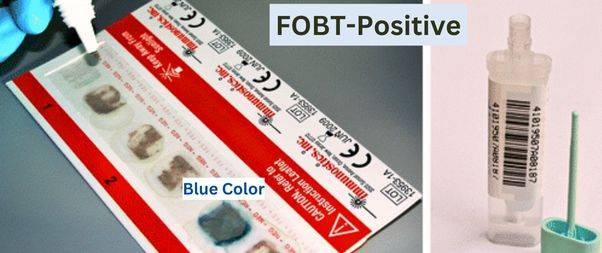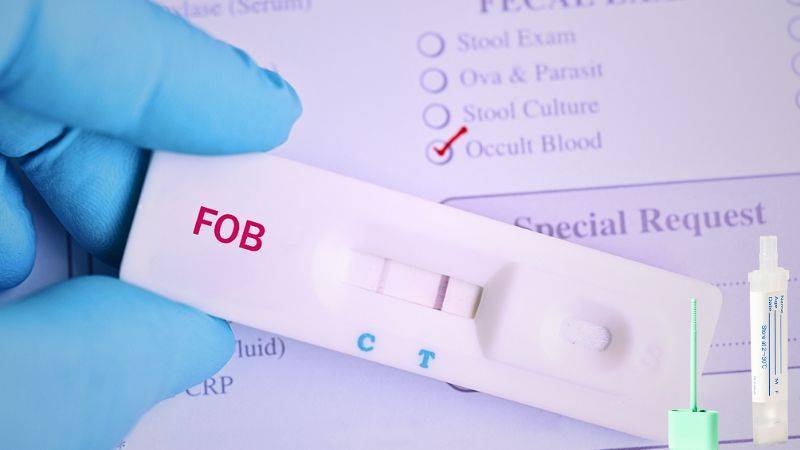The Fecal Occult Blood Test, commonly known as the FOBT, is a widely used, non-invasive diagnostic tool designed to detect hidden or ‘occult’ blood in the stool.
A positive result may be indicative of various gastrointestinal issues, one of the most serious being colorectal cancer.
However, a positive FOBT result doesn’t automatically mean cancer.
In this article, we delve into the specifics and demystify what percentage of positive results can indeed be traced back to cancer.
Fecal Occult Blood Test (FOBT)

The Fecal Occult Blood Test (FOBT) is a laboratory procedure employed to analyze stool samples for hidden or ‘occult’ blood.
It is primarily employed as an early screening test for colorectal cancer or the existence of polyps in the colon or rectum, although it should be noted that not all cancers or polyps bleed.
It’s important to understand that the FOBT can merely ascertain the presence or absence of blood—it does not provide insight into the underlying cause of the bleeding.
It is not advised to rely solely on a fecal occult blood test if you’re exhibiting symptoms of colon cancer.
If you detect blood in your stool or toilet, or if you are experiencing abdominal discomfort or noticeable changes in your bowel habits, it is recommended that you arrange a consultation with your healthcare provider.
This ‘occult’ blood, undetectable under normal circumstances, can be identified through the FOBT, thereby raising a red flag that something might be amiss.
Significance of a Positive FOBT

A positive FOBT can undoubtedly be unsettling. It suggests the presence of blood in your stool, a symptom often associated with colorectal cancer.
However, it’s crucial to understand that it is merely a preliminary screening tool, not a definitive diagnostic measure.
A positive result merely indicates the need for further investigation, typically through more definitive diagnostic procedures like a colonoscopy.
Percentage of Positive FOBT Results that Indicate Cancer
Based on various studies, the percentage of individuals with a positive FOBT who are subsequently diagnosed with colorectal cancer upon further investigation is relatively low – roughly between 2% and 10%.
This figure varies due to a range of factors, including the patient population, the design of the screening program, and the processing and interpretation of the tests.
While it’s true that a positive FOBT could be an early sign of colorectal cancer, it’s also important to remember that other, less severe conditions might be the cause.
These include
all of which can lead to gastrointestinal bleeding and, consequently, a positive FOBT.
Potential Risks
The FOBT, despite its utility, does come with potential risks and limitations, including:
- The test may not always provide accurate results. There’s a chance that your FOBT could yield a negative result despite the presence of cancer (a situation known as a false-negative result), particularly if your cancer or polyps aren’t bleeding.
- Your test could present a positive result in the absence of cancer (a false-positive result). This can occur if there is bleeding from other sources, such as a stomach ulcer, hemorrhoid, or even blood that’s been swallowed from your mouth or nose.
Undergoing an FOBT may necessitate further testing. In the event of a positive FOBT result, your physician may advise you to undergo an additional examination of your colon, such as a colonoscopy.
An Invitation for Further Investigation, Not a Cancer Confirmation

In conclusion, a positive FOBT result should be seen as an invitation for further investigation, not an outright cancer diagnosis.
A myriad of other conditions could lead to a positive result, and only a small percentage of positive FOBT tests end up being indicative of colorectal cancer.
If you’ve had a positive FOBT, it’s vital not to panic but instead to follow up with your healthcare provider to determine the next appropriate steps. Usually, this will involve further tests to identify the source of bleeding and, if necessary, suitable treatment options.
Remember, the FOBT is primarily a preventative tool designed to catch potential issues early.
It’s a first line of defense in a broader, comprehensive approach to maintaining gastrointestinal health.
It might seem daunting, but remember: early detection is a critical step in the successful treatment of colorectal cancer.
So, keep up with your regular screenings, follow your doctor’s advice, and stay informed about your health.
Take Care of Yourself!
Related Articles:






